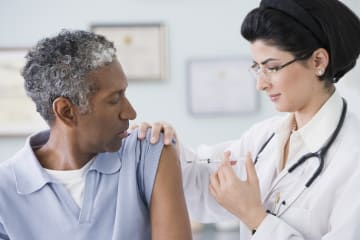
Why do you need vaccines if you don't have a working spleen?
The spleen is an organ in the upper left side of the belly that filters the blood. It helps the immune system by fighting certain types of bacteria. If your spleen is removed or doesn't work, your body will be less able to fight some serious infections. Vaccines (given in shots) help prevent these infections.
If you know in advance that you will have your spleen removed, you can get certain vaccines before your surgery.
Which vaccines do you need?
These are the vaccines you need if you don't have a spleen:
- Haemophilus influenzae type b (Hib).
-
One dose, if you've never had it before.
- Influenza.
-
One dose every fall or winter.
- Meningococcal vaccine (MenACWY).
-
Two doses 8 weeks apart. Your doctor can tell you if you will need booster doses.
- Meningococcal B (MenB).
-
A series of 2 or 3 doses.
- Pneumococcal vaccines (pneumococcal conjugate PCV13, PCV15, and PCV20 and pneumococcal polysacccharide PPSV23).
-
PCV20 as a single dose or PCV15 followed at least 8 weeks later by PPSV23. Your doctor can tell you if you need to follow a different vaccine schedule.
- Tetanus, diphtheria, pertussis (whooping cough) (Tdap, Td).
-
One dose of the adult Tdap (whooping cough) vaccine, if you've never had it before. You need a Td (tetanus and diphtheria) booster every 10 years.
You may need these other vaccines if your doctor thinks you are at risk:
- Hepatitis A (HepA).
-
Two doses given 6 to 12 months apart.
- Hepatitis B (HepB).
-
Three doses given over a 6-month period.
- Human papillomavirus (HPV).
-
Three doses given over a 6-month period.
- Measles, mumps, rubella (MMR).
-
At least one dose, if you were born after 1956.
- Varicella (chickenpox).
-
Two doses, if you've never had chickenpox or this vaccine.
- Zoster (shingles).
-
Two doses of Shingrix, if you're age 19 or older.
What are the risks?
Most side effects from vaccines are minor, if they occur at all. You may have redness, mild swelling, or soreness where the shot was given. You also may have a slight fever. Serious reactions, such as trouble breathing or a high fever, are rare.
If you have an unusual reaction, call your doctor.
Current as of: October 24, 2024
Author: Ignite Healthwise, LLC Staff
Clinical Review Board
All Ignite Healthwise, LLC education is reviewed by a team that includes physicians, nurses, advanced practitioners, registered dieticians, and other healthcare professionals.

